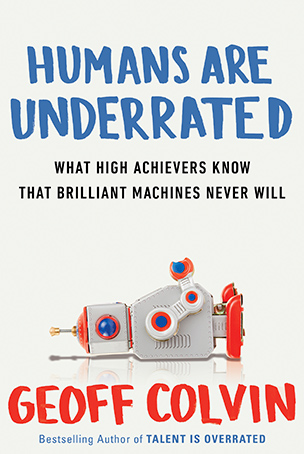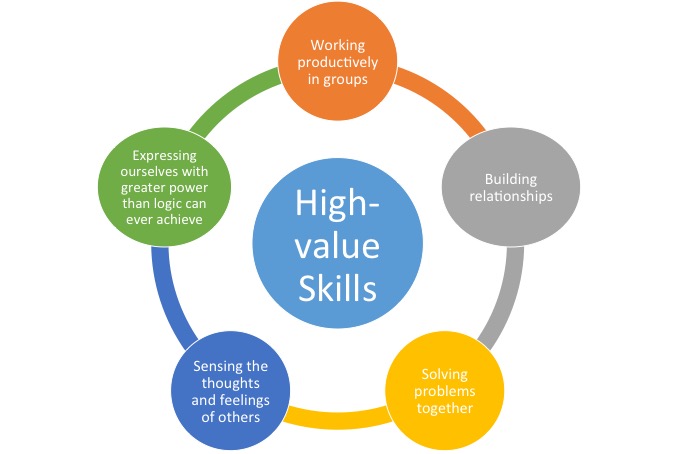This is the first blog post in a two-part series highlighting the work of the 2016 IPR Annual Distinguished Lecturer Geoff Colvin, Senior Editor-at-Large at Fortune.

Last week, PRWeek reported global PR revenue increased 5% in 2015 due in large part to digital media and technologies that have disrupted our industry. But what about the future of our industry in an age of digital disruption?
Two months ago, Pew Research Center found within 50 years a majority of Americans predict robots and computers will do much of the work currently done by humans. Increased processor and networking speeds, decreased prices, and more consumer-oriented architecture, including social platforms, have led research scientists to foresee a much different workforce than what we have today, having a tremendous impact on our field. Are we prepared?
While some futurists fear the impact of automation on jobs, Geoff Colvin, senior editor-at-large at Fortune, contends these technological advances, including artificial intelligence 
While STEM—science, technology, engineering, and mathematics—will continue to be important, Colvin believes new high-value skills will be the key to our success. Colvin said, “Getting organizations to switch direction quickly and ever more frequently isn’t easy, and doing so requires a command of the skills that can reach deep into people’s brains, the skills that are in danger of fading.”
These are the abilities that define us as humans—we all have the potential for them but may need to work on them. We need these abilities (see Figure 1) to be successful in our industry, as we have seen the role of Peter Drucker’s 1950s “knowledge worker” evolve to Colvin’s “relationship worker.”:
Possessing these skills is easier said than done and people may need help honing them. One in particular that Colvin spends considerable time discussing in his book is empathy, a crucial 21st century skill. Not to be confused with sympathy, empathy is defined by Colvin as “discerning what some other person is thinking and feeling, and responding in an appropriate way.” While we are all programmed for being empathic, Colvin says we need to build it back up; it’s “a wasting muscle.” He blames this in part the decline of face-to-face contact and the social media revolution as people can now earn a living while having little empathy.
Colvin admits today’s technological advances have played a role in increasing unemployment rates, slow wage growth, and college graduates taking jobs that don’t require bachelor degrees. Technology, according to Colvin, is disrupting many long-standing models across verticals that have a much shorter shelf life than their predecessors.
Regardless of the technology, Colvin makes it clear humans are hardwired for social interaction and relationships are a crucial focus of our lives. He believes we should teach kids to value technology, but also focus on the richness of the interpersonal experience. People who can empathize, collaborate, create, and build relationships will be most successful. Corporations, governments, and education systems can’t keep up with the transition to these “soft” skills.
Colvin argues humans have spent more than a millennia looking outward for the new skills they need to acquire, but it’s time to look inward. While we can’t make certain predictions of the future, we can help prepare by focusing and cultivating these abilities. These go hand-in-hand with technologies that focus on individualized and community experiences. In our industry, we must be prepared to embrace and evolve with the rapid field of changing technologies. Technological changes are moving fast, and while we can’t predict all of them, we can help prepare ourselves by focusing on improving our emotional intelligence.
To attend the 2016 IPR Annual Distinguished Lecture and Awards Dinner with Geoff Colvin, please visit https://instituteforpr.org/events/distinguished/. Tina’s next blog post about Geoff Colvin’s research will discuss the cognitive era and the impact of storytelling.
Geoff Colvin, Fortune’s senior editor-at-large, is one of America’s most respected journalists. He lectures widely and is the regular lead moderator for the Fortune Global Forum. He appears frequently on TVB and is heard daily on the CBS Radio Network, reaching seven million listeners each week. His book Talent is Overrated was a national bestseller.
Tina McCorkindale, Ph.D., APR, is the President and CEO of the Institute for Public Relations. She has taught at several universities, and has worked in corporate communications and analytics. She lectures on digital media, education, and research in the industry. She lives in Seattle, Washington.






